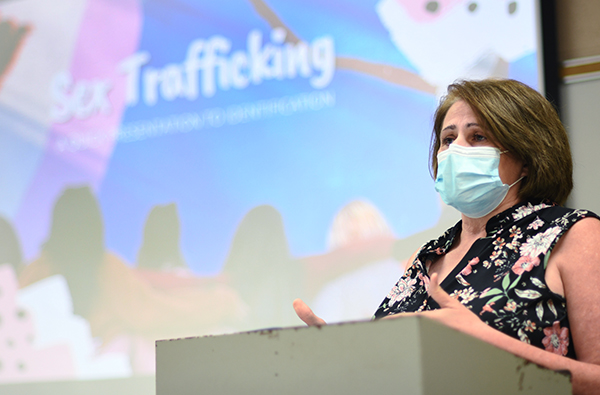News
Speakers Share Realities of Sex Trafficking
09/10/20
 Sex traffickers rely on misinformation and lack of education about the reality of their crime to perpetuate it, said Dr. Natalie Johnson, associate professor of criminal justice at Dalton State.
Sex traffickers rely on misinformation and lack of education about the reality of their crime to perpetuate it, said Dr. Natalie Johnson, associate professor of criminal justice at Dalton State.
“There is so much misinformation out there,” Johnson said. “If parents truly want to do everything they can to protect their children, they need to learn the facts about sex trafficking from professionals and not memes online. This includes learning who is at risk and why. Too many believe the myth it’s only runaways or throwaway kids at risk. Anyone can be a victim. Learn the red flags. Learn traffickers can be anyone. They don’t look like monsters. They can be doctors, lawyers, teachers, clergy, plumbers, janitors, electricians, even parents. Understand the dynamics of trafficking so we don’t victim blame. Neither children, nor adults, choose this.”
It is important to educate others, especially those who are entering a criminal justice field. Not only does Johnson bring in expert speakers who work to end sex trafficking, but she requires her students to journal their experience spreading correct information.
Debbie Crumbly, CEO and director of women’s care for End Slavery Georgia, and Danielle Mullen, director of survivor care for End Slavery Georgia, recently spoke in Johnson’s sex trafficking course about their work in the state. End Slavery Georgia focuses on helping survivors. Some people incorrectly assume sex trafficking is a crime that only happens overseas, but trafficking occurs everywhere, including Northwest Georgia, they said.
“Human trafficking is one of the top three – I argue it’s the top – illegal industries in the world,” Mullen said. “That is what you’re up against as future criminal justice professionals. Some people claim slavery has been abolished, but it hasn’t. Sex trafficking is slavery.”
Sex trafficking is a high-dollar, low risk crime, Mullen said. The average trafficker in Atlanta makes $32,000 each week per victim, she said. It is much more prevalent in society than many people realize, she said. Many times, victims do not speak out because they are not believed, and they fear for their safety or the safety of a loved one. End Slavery Georgia partner with organizations to help rescue those being trafficked and then, provides counseling, medical care and other basic services.
.jpg) This crime is not new, Crumbly said. Though the crime is in the spotlight right now, there is no indication it is happening more frequently, she said.
This crime is not new, Crumbly said. Though the crime is in the spotlight right now, there is no indication it is happening more frequently, she said.
Speakers such as Crumbly and Mullen help students see how what they’re learning in the classroom applies in the field after graduation.
“It’s important to bring in guest speakers because they are the ones who work in the field,” Johnson said. “They have insight, and it gives students an inside look into career opportunities. I always hope students draw connections between what I’m teaching and what the guest speakers have to say about their experience. The speakers show them what I’m teaching in class is truly applicable to their careers.”
“Exposure is the best thing about having guest lecturers,” said Corey Creek, a psychology major minoring in criminal justice. “Many of us are drawn to this field to change the world, and being exposed to people that live and work inside the criminal justice field helps us get an idea of what life will be like for us when we graduate. I learned so much hearing from the people from End Slavery Georgia, mostly that helping women who are survivors of sex trafficking is a long process. There is no linear solution to easing them back into society. Only with exposure and advocacy will we see change when it comes to human trafficking. Then we will finally see the needle move toward progress.”
